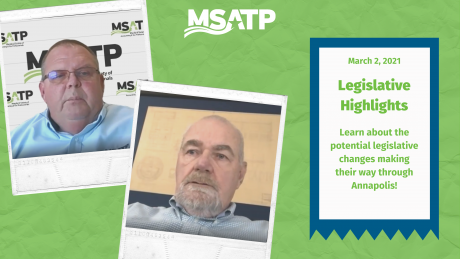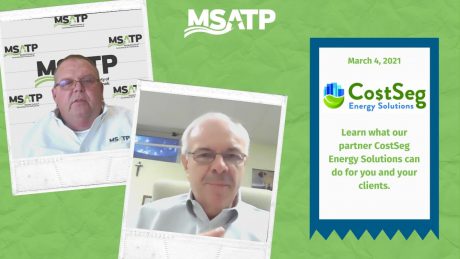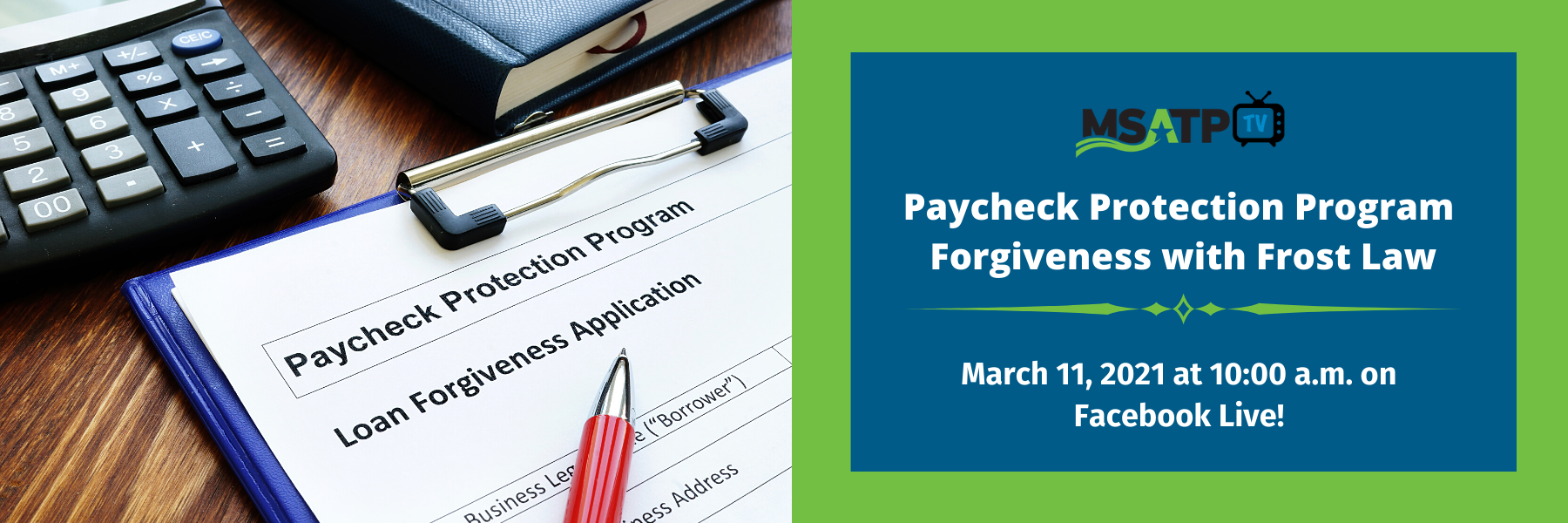News for Your Week Ahead: March 5, 2020

Executive Director Bill Feehley and CPR Committee member Jim Arnie provided a legislative update for the current session. Be sure to watch so you can get up to date!
Watch on YouTube.

Jerry Lotz of CostSeg Energy Solutions joins Executive Director Bill Feehley to discuss the tax savings for owners/lessors of commercial/residential rental property.
Watch on YouTube.

Have questions about PPP Loan Forgiveness? Join @Frost Law PPP expert Peter Haukebo right here on MSATP TV live on March 11, 2021 at 10 a.m. to get your questions answered! Comment your questions on our Facebook page, or email info@msatp.org. Don’t forget to tune in for the live presentation!
IRS Reminds Businesses to Report Large Cash Transactions; E-File Encouraged | IR-2021-47
The IRS reminds businesses of their responsibility to file Form 8300, Report of Cash Payments Over $10,000, and encourages e-filing to help them file accurate, complete forms.
Although many cash transactions are legitimate, information reported on Form 8300 can help stop those who evade taxes, profit from drug trading, engage in terrorist financing and conduct other criminal activities. The government can often trace money from these illegal activities through payments reported on complete, accurate forms.
For more information, click here.
Tax Time Guide: Didn’t Get Economic Impact Payments? Check Eligibility for Recovery Rebate Credit | IR-2021-49
The IRS reminds first-time filers and those who usually don’t have a federal filing requirement to consider filing a 2020 tax return. They may be eligible to claim the Recovery Rebate Credit, a new refundable credit, authorized by the Coronavirus Aid, Relief, and Economic Security (CARES) Act and the COVID-related Tax Relief Act.
Most individuals eligible for the Recovery Rebate Credit have already received the full amount in two rounds of payments, known as Economic Impact Payments. All legally permitted first and second Economic Impact Payments have been issued.
For more information, click here.
IRS Releases 2021 National Public Liaison Meeting Schedule
The IRS has released its revised 2021 National Public Liaison Meeting Schedule. The specific updates are as follows:
- The 2021 Nationwide Tax Forums will no longer take place in person. The Tax Forums are now virtual.
- Specific dates are provided for the virtual Tax Forums.
To see the full schedule please click here.
Comptroller’s Office Mails 27,000+ Payments to Marylanders Stuck in Unemployment Disputes
ANNAPOLIS, Md. (March 4, 2021) – Comptroller Peter Franchot today announced that checks to the 27,181 recipients identified by the Maryland Department of Labor for unemployment grants have been processed and mailed. The payments were processed less than 24 hours after the Labor Department provided the Comptroller’s Office with a list of recipients, as required by the RELIEF Act.
The RELIEF Act provided appropriations for 32,000, one-time $1,000 grants to unemployment insurance filers who remain in adjudication and have not received unemployment payments. Under the legislation, the Secretary of Labor determines recipients of the unemployment grants, and the Comptroller’s Office – as the State’s paymaster – would disburse payments to the identified grant recipients.
For more information, click here.
Tips to Help Take the Stress out of Tax Season
Every filing season comes with its own set of challenges and 2021 is no different. The IRS wants taxpayers get the information they need as quickly as possible. Taxpayers can keep in mind these tips when they get ready to file. Following them will help get this year’s taxes done accurately and refunds issued timely.
- Gather records. Good recordkeeping makes preparing a tax return easier. It can also ensure taxpayers do not overlook deductions and credits.
- Start with IRS.gov. IRS.gov is available around-the-clock and it’s the fastest way to get assistance. Millions of people use IRS.gov for filing and paying taxes, getting information about their accounts or answers to tax questions. The IRS Services Guide outlines the many ways taxpayers can get help from the IRS.
- Use online tools. IRS.gov has many useful online tools. The Interactive Tax Assistant provides answers to many tax questions specific to an individual’s circumstances. It gives the same answers that an IRS representative would give over the phone.
- Choose a reputable preparer. Taxpayers can self-prepare or use a tax preparer. IRS.gov has resources to help people choose a tax pro. The IRS Directory of Federal Tax Return Preparers provides information on who has a professional credential or participates in the IRS Annual Filing Season Program.
- File electronically. IRS Free File can help taxpayers figure things like their earned income tax credit, child and dependent care credit, and recovery rebate credit. MilTax online software is also available for the members of military and certain veterans, regardless of income, and is offered through the Department of Defense. Some Free File options are available in Spanish.
- Choose direct deposit. Filing electronically and choosing direct deposit is the safest and easiest way to file an accurate tax return and the fastest way to get a refund.
- Report all income. Taxpayers must report their income from all sources, including the gig economy, Forms W-2, Wage and Tax Statements, and Forms 1099. Other income may be reportable as well, even if the taxpayer does not receive a statement.
- Report unemployment benefits. Taxpayers who received unemployment benefits in 2020, must report the amount received as taxable income on their tax return.
- Avoid errors. Taxpayers should take extra time to review their tax return so they can file a complete and accurate return and avoid refund delays. Filing electronically is the most accurate way to eliminate many common errors. Check all names and double check all Social Security numbers as well as, account and routing numbers for direct deposit.
- Review Publication 17. This guide is available in English and Spanish on IRS.gov and translations in Russian, Vietnamese, Korean and Chinese – simplified and traditional – will be available soon. The new format makes it easier to navigate and faster to download. The 2020 edition is now accessible on most personal electronic devices as an eBook.



